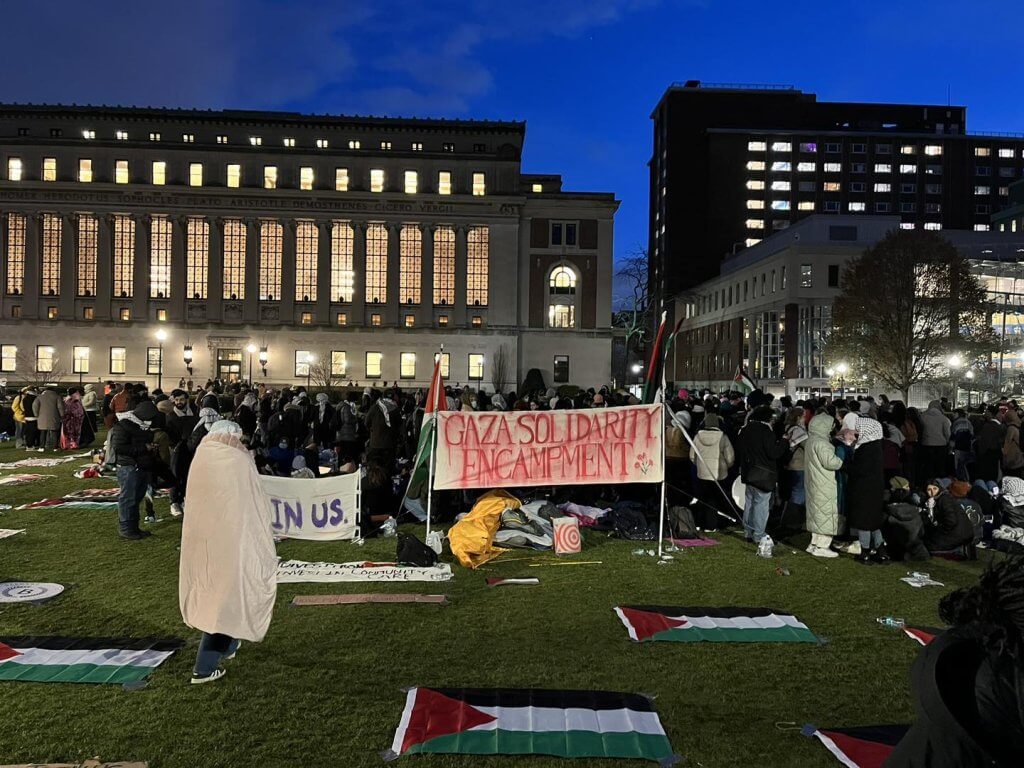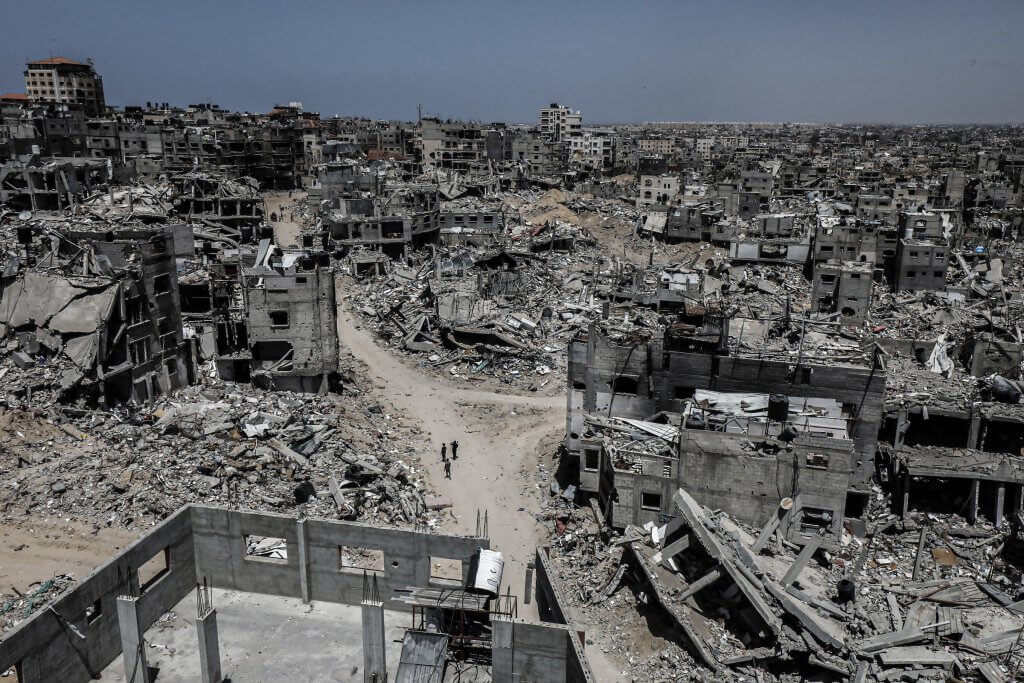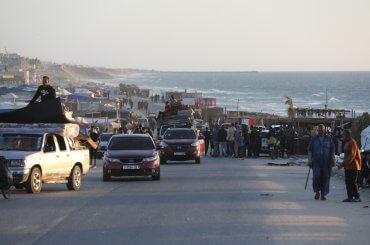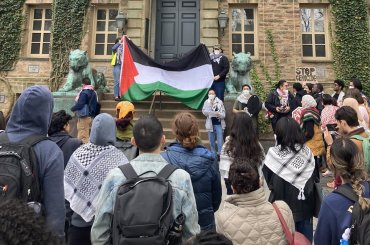I was glued to my phone yesterday.
It was no different than most of my days over the past seven months. But for perhaps the first time since last October, I wasn’t completely overwhelmed with grief and sadness. I was feeling inspired, invigorated, and hopeful.
I was watching videos of students and faculty at my alma mater, NYU, linked arm in arm, as they stood proudly in solidarity with Palestine at the newly established NYU Gaza Solidarity Encampment – which had been set up in the same location where 10 years earlier, I participated as a student in a much smaller protest for Palestine.
When I was a student at NYU and a part of the Students for Justice in Palestine (SJP) group on campus, we were subjected to fear-mongering by the university over our actions, demonization by the press, and the constant threat of being falsely labeled as antisemites. Essentially, all the same challenges students are facing today. The only difference was, when I was a student, I would have never imagined in my wildest dreams that pro-Palestine protests would be drawing the crowds they are today.
By the time I was watching the events at NYU unfold, NYU was already one of around a dozen universities where students had established similar solidarity camps, emulating the Columbia camp that was established, dismantled, and reestablished last week.
Watching the Columbia student protests – which have remained steadfast for months despite physical attacks on student protesters and a national smear campaign against them – and all the other protests they have inspired has been a truly incredible thing to witness unfold.
We are witnessing history in real time, and one can’t help but feel that while the crackdowns will no doubt escalate, these students are charting a new path forward in this country. A path that rejects colonization and imperialism, and rejects the complicity of our academic institutions in the U.S. war machine and in global oppression. And of course, feeling that with every new protest, these students are creating a future where solidarity with Palestine can one day be expressed freely, proudly, and without consequence or fear for your academic career or future job prospects.

But as I scrolled on social media, my feed inundated with posts and videos of different encampments and protests, I could not shake from my mind a conversation we had in our editorial meeting earlier that day.
Another mass grave – yes, another one – was being uncovered outside the Nasser Medical Complex in the southern Gaza city of Khan Younis. Reports were still emerging, but there were hundreds of bodies of men, women, and children being uncovered – and practically no one was talking about it.
Later that day, amid a sea of posts about student protests, I scrolled on X only to see a photo of a decomposing body in Gaza, in what appeared to be medical scrubs, with the hands of the person zip-tied together. A few posts down, I saw two more photos: one of a buried body with bandages still wrapped around the person’s legs, and another of a body covered in sand, with what looked like a catheter still attached to the person’s abdomen.
Unspeakable crimes happened there. And Israel tried to cover them up, literally, by burying these bodies in mass graves. The fact that a new mass grave was found outside a hospital that Israel raided – just one week after another mass grave was found outside a different hospital in northern Gaza – should have been front-page news on every media outlet in the U.S., and around the world. It should be the lead story on every cable news network, and it should be getting round-the-clock coverage as bodies and crimes continue to be uncovered.
Except, when you Google search the term ‘Gaza’, these are the top headlines that come up:
Washington Post: Middle East conflict live updates: Campus antiwar protests escalate; U.N. officials call for probe into graves at Gaza …
AP News: With graduation near, colleges seek to balance safety and students’ right to protest Gaza war
BBC: Mass arrests made as US campus protests over Gaza spread
Reuters: What is behind US college protests over Israel-Gaza war?
NPR: Up First briefing: College protests over Gaza war; SCOTUS Starbucks union case
The Hill: Columbia kicks the hornet’s nest with student protests over Israel-Hamas war
You get the picture.
It was quite incredible to see how quickly even those of us who have been speaking about the atrocities in Gaza since Day 1, quickly got distracted by events unfolding on U.S. college campuses. How, protests that were quite literally started in order to bring attention to the genocide in Gaza, have instead themselves become the story.
It is by no fault of the students, however. In fact, the courageous students at Columbia and elsewhere have been clear: their protests are in solidarity with Gaza, and they reject the cooptation of their movement to distract from the genocide.
So, in order to do justice to the movement, and do justice to the Palestinian people who are fighting for survival under a genocide that has surpassed 200 days – we must not let the protests, or the bad-faith attempts to smear them, distract us from the real issues at hand; from the fact that mass graves are being uncovered all across Gaza at alarming rates, that the bombing continues till this day, and that an invasion of Rafah is just a matter of when, not if.
These protests should be amplified, and the attempts by the universities to quash free speech and free expression should be condemned. But we must force ourselves and the media to re-center the conversation to Gaza. After seven months, 200 days, of genocide, the people of Gaza cannot afford our distraction.



Good point. Also, we should not be confused or distracted by smokescreens:
https://www.theguardian.com/world/2024/apr/24/officials-voice-concern-over-us-plans-for-gaza-aid-pier
Will the Freedom Flotilla Sail to Gaza?
April 24, 2024
Türkiye is under pressure from the U.S. and Israel to block a flotilla from delivering aid and breaking the Gaza blockade, writes Medea Benjamin.
By Medea Benjamin
Peoples Dispatch
“The non-violence training to join the Freedom Flotilla Coalition’s ships to Gaza has been intense. As hundreds of us from 32 countries gathered in Istanbul, we were briefed about what we might encounter on this voyage. “We have to be ready for every possibility,” our trainers insisted.
The best scenario, they said, is that our three ships — one carrying 5500 tons of humanitarian aid and two carrying the passengers — will reach Gaza and accomplish our mission.
Another scenario would be that the Turkish government might cave to pressure from Israel, the U.S. and Germany and prevent the boats from even leaving Istanbul. This happened in 2011, when the Greek government buckled under pressure and 10 boats were stalled in Greece.
With our boats docked in Istanbul today, we fear that Turkish President Erdogan, who recently suffered a crushing blow in local elections, is vulnerable to any economic blackmail the Western powers might be threatening.
Another possibility is that the ships take off but the Israelis illegally hijack these in international waters, confiscate our boats and supplies, and arrest, imprison us and eventually deport us.”
https://consortiumnews.com/2024/04/24/will-the-freedom-flotilla-sail-to-gaza/
There no substitute for reporting from Gaza. And for many people of my generation, there is no substitute for TV as a source of news. Last night I saw one of those advertisements for a charity that showed hungry and abused dogs. The voice-over asked “if you saw a starving animal, what would you do? If you saw an injured animal, what would you do?” These ads are obviously effective fund-raising appeals: they run because they get people to sign up to donate their monthly $19 or whatever. Based on my own, non-scientific viewing sample, images on MSM from Gaza have become less frequent, more fleeting.
(Prior to this year, my local public broadcasting station daily showed news stories from BBC, DW, and France 24 for global audiences. Though they too were carefully edited, I found them a useful addition to the US MSM. But this year they abruptly ceased. Instead we get stories about Japan from NHK 24/7. It is interesting and informative–well worth watching–but not an adequate substitute for what was lost. I wrote a couple of times to my PBS station asking about this, but never go a reply.)
Broadcast time is limited. Time spent on Mike Johnson calling for the National Guard to shut down campus demonstrations is legitimate reporting, but also is not a substitute for reporting on events in Gaza. A recent report from CBS is typical. It’s not worse than other networks. In her interview with the Pope, O’Donnell specifically mentioned starving children in Gaza and Ukraine. So I’m not singling CBS out for criticism. It may well be better than the others.
This CBS report linked below is also noteworthy as an example of reporting we have seen elsewhere that–by the simple omission of the word “some”–can read as suggesting that all, rather than some, Jewish student organizations are opposed to and victims of the demonstrations, rather than a key part of the demonstrations.
https://www.cbsnews.com/news/university-protests-us-israel-hamas-war-netanyahu-and-palestinians-react/
Mass grave:
https://www.jpost.com/israel-hamas-war/article-798509
Palestine’s support system best assume it will not have a permanent place in media and world attention. Insights are needed on how to capitalize on the current political opportunity. Hopelessness can take over.